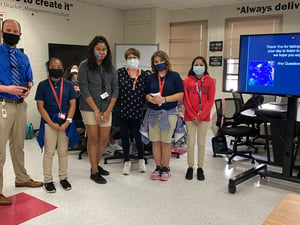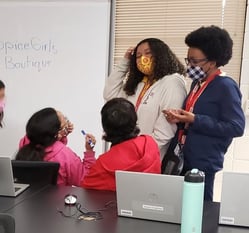This article was originally posted on ACTE on October 28, 2020. This post was contributed as a guest post and was written by Jessica Babb and Kelly Wilson, educators at Collier County Schools in Naples, Florida. The article below appears in its entirety.
When we’re kids, we can’t wait to grow up.
We want a cool job, a paycheck, and to make a difference in the world. Many of us wait until we’re adults to take the first step toward career goals… But today’s young entrepreneurs are taking matters into their own hands at an early age in Collier County, Florida.
Middle school students enrolled in early entrepreneurship programs ideate, innovate and create a business. Often, they fail, shift gears and try again. They learn by doing and we, their teachers, learn by watching them chase their dreams.
Career and technical education in middle school
Career and technical education (CTE) exposes secondary and postsecondary students to high-demand careers. But Perkins V presents an important opportunity to expand opportunities for younger students. Middle schools can now access the benefits of Perkins Grant funding for entrepreneurship programs to support student career exposure and growth.
 CTE helps students develop technical skills, yes, but CTE programs also help students develop valuable skills such as critical thinking. They begin to embrace learning, so they can continue to thrive beyond the walls of a classroom. Middle schoolers have boundless talents and capabilities, when presented with opportunities to collaborate and be creative. All while developing critical skills around collaboration, problem solving and confidence!
CTE helps students develop technical skills, yes, but CTE programs also help students develop valuable skills such as critical thinking. They begin to embrace learning, so they can continue to thrive beyond the walls of a classroom. Middle schoolers have boundless talents and capabilities, when presented with opportunities to collaborate and be creative. All while developing critical skills around collaboration, problem solving and confidence!
What does teaching entrepreneurship mean for educators?
To be honest, we love our entrepreneurship programs just as much as our students do. Entrepreneurship education challenges everyone in the classroom to think outside the box. Educators learn to be okay with not knowing all the answers… And our students have to be okay learning in a different way. Traditionally, I am very regimented. I am very scheduled. I go piece by piece and I don’t miss a beat. That was something I had to unlearn with entrepreneurship.
It’s not prescriptive, so you have to be flexible. If we don’t cover the entire marketing piece or not every student understands the financial component of mxINCedu, that’s okay. mxINCedu empowers students with the tools and mindset to explore what it takes to be an entrepreneur.
What do students gain from entrepreneurship education?
A better question might be, “What don’t students gain from entrepreneurship education?”
Resilience
One of the most unique skills developed — and one we didn’t expect: Students developed the ability to practice resilience. By resilience we mean many are starting from scratch at this age!
Our students work with unfamiliar classmates, and they’re all sharing different ideas. They stumble. And they continue forward because, ultimately, there is a business they want to create.
Resilience involves learning how to handle rejection. Students pick themselves up, and they figure out what to do differently. Entrepreneurship education teaches middle schoolers how to navigate these challenges.
Public speaking
With finding one’s voice comes the responsibility of sharing it. That’s where public speaking skills come in. Early in her program, one student expressed fear of speaking in front of a group; she hid behind her hair. But… By the time we held our culminating event, the district’s STEAM conference, she was confident as she spoke with the ABC and NBC TV news crews. And she had fun.
Empowering students in the age of COVID-19
 We live in extraordinary times. Entrepreneurship education encourages students to think about the problems they see around them and ask, How do we solve those problems with a business solution? Students generate and act on self-driven ideas. And then we see the students grow in all these ways — socially, emotionally, academically. A foundation in entrepreneurship education will benefit our students as they, and society, cope with all kinds of trauma around COVID-19.
We live in extraordinary times. Entrepreneurship education encourages students to think about the problems they see around them and ask, How do we solve those problems with a business solution? Students generate and act on self-driven ideas. And then we see the students grow in all these ways — socially, emotionally, academically. A foundation in entrepreneurship education will benefit our students as they, and society, cope with all kinds of trauma around COVID-19.
My students who don’t feel very successful with their core classes really love entrepreneurship because they can showcase their other skills. It’s all about helping them realize: There’s a place for me. There’s a place for my little quirkiness.
About the authors:
Jessica Babb and Kelly Wilson are champions of student entrepreneurship at Collier County Schools in Naples, Florida. Collier County is a community of entrepreneurs, where 92% of businesses are small business with nine or fewer employees. The Greater Naples Chamber of Commerce embraced an initiative to support entrepreneurial learning in Collier County through mentorship and by sponsoring the Naples Children’s Business Fair. Wilson and Babb are also entrepreneurs in the community — real estate agents working together as a team.
